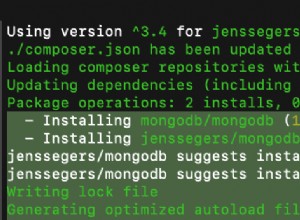Non ho familiarità con Mongoose, tuttavia ho cercato di adattare il suo esempio al tuo caso di seguito. Nota ho cambiato il createdAt default proprietà da un valore a una funzione e aggiunto un campo aggiuntivo datestamp al tuo schema:
var oneday = 24 * 60 * 60;
var schema = new Schema({
aid: { type: Number }
, name: { type: String }
, score: { type: Number }
// default: is a function and called every time; not a one-time value!
, createdAt: { type: Date, default: Date.now }
// For grouping by day; documents created on same day should have same value
, datestamp: { type: Number
, default: function () { return Math.floor(Date.now() / oneday); }
}
});
schema.statics.getLastWeek = function(name, fn) {
var oneweekago = Date.now() - (7 * oneday);
ret = this.collection.group({
// Group by this key. One document per unique datestamp is returned.
key: "datestamp"
// Seed document for each group in result array.
, initial: { "createdAt": 0 }
// Update seed document if more recent document found.
, reduce: function(doc, prev) {
if (doc.createdAt > prev.createdAt) {
prev.createdAt = doc.createdAt;
prev.score = doc.score;
// Add other fields, if desired:
prev.name = doc.name;
}
// Process only documents created within past seven days
, condition: { "createdAt" : {"$gt": oneweekago} }
}});
return ret.retval;
// Note ret, the result of group() has other useful fields like:
// total "count" of documents,
// number of unique "keys",
// and "ok" is false if a problem occurred during group()
);




